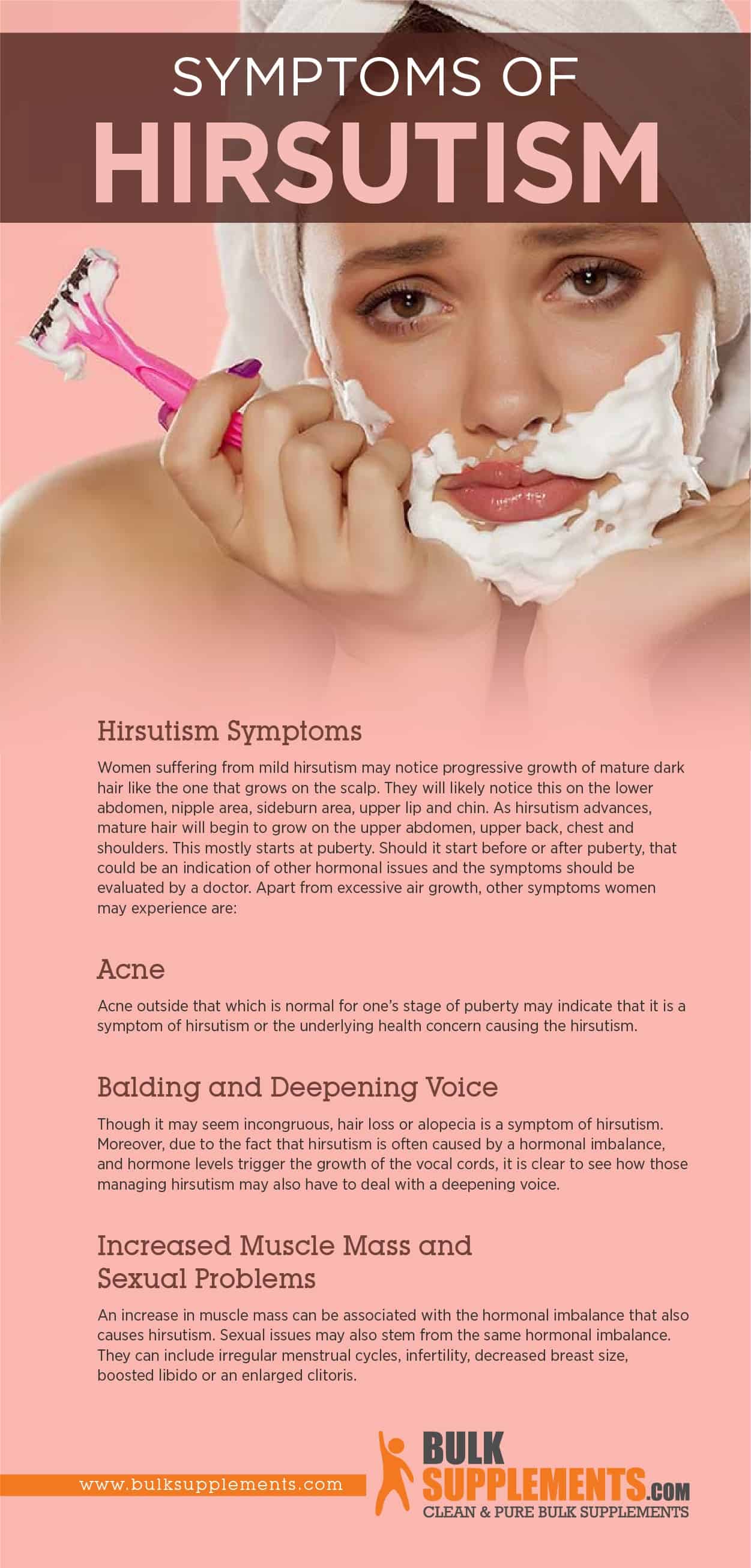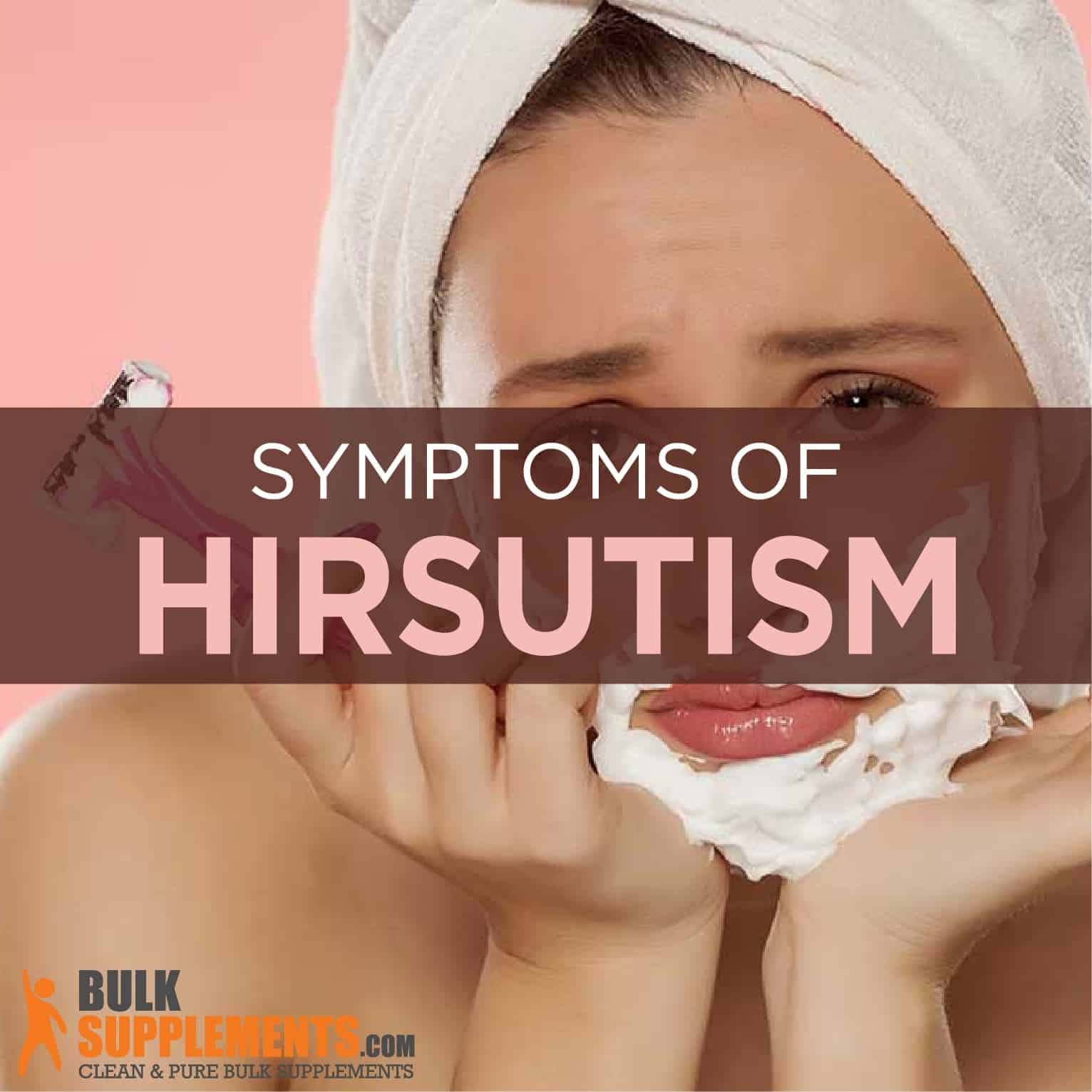What is Hirsutism?
Hirsutism refers to the growth of hair in women in a male pattern. The condition can occur in both men and women, but it is more common and often more of a problem in women (x). Women with this condition tend to grow hair in unwanted places like the abdomen, chin and upper lip. Women suffering from hirsutism will also tend to have dark and thick hair in areas like the face, legs and arms. About 10 percent of women in the U.S. have hirsutism (x).
Presence of hirsutism is an indication of hormonal imbalance. Approximately half the people with hirsutism have excess androgens (x, x). This may be a result of an underlying health issue, which can be serious or mild.
Polycystic ovary syndrome (PCOS) is often the underlying issue in women who present with hirsutism. Approximately 70 percent of individuals with hirsutism end up with the diagnosis for PCOS (x). PCOS is often associated with symptoms like balding, acne, obesity, infertility and irregular menstrual cycles. These symptoms develop over a period of time in a process called virilization.
Along with natural causes of hirsutism, other factors can cause temporary hirsutism such as steroid use, birth control pills, hormone treatments and some medications. Cushing’s syndrome can also trigger the development of hirsutism.
A number of treatments for hirsutism are available, which include herbal, supplemental and home remedies.
Hirsutism Symptoms
Women suffering from mild hirsutism may notice progressive growth of mature dark hair like the one that grows on the scalp. They will likely notice this on the lower abdomen, nipple area, sideburn area, upper lip and chin. As hirsutism advances, mature hair will begin to grow on the upper abdomen, upper back, chest and shoulders. This mostly starts at puberty (x). Should it start before or after puberty, that could be an indication of other hormonal issues and the symptoms should be evaluated by a doctor. Apart from excessive hair growth, other symptoms women may experience are:
Acne
Acne outside that which is normal for one’s stage of puberty may indicate that it is a symptom of hirsutism or the underlying health concern causing the hirsutism (x).
Balding and Deepening Voice
Though it may seem incongruous, hair loss or alopecia is a symptom of hirsutism (x). Moreover, due to the fact that hirsutism is often caused by a hormonal imbalance, and hormone levels trigger the growth of the vocal cords, it is clear to see how those managing hirsutism may also have to deal with a deepening voice (x).
Increased Muscle Mass and Intimacy Problems
An increase in muscle mass can be associated with the hormonal imbalance that also causes hirsutism (x). Intimacy issues may also stem from the same hormonal imbalance. They can include irregular menstrual cycles, infertility, decreased breast size, boosted passion or an enlarged clitoris (x, x, x, x).

Causes of Hirsutism
Hormonal Imbalance During Puberty
During puberty, a girl’s ovaries start to produce and release a mix of female and male sex hormones, which lead to the growth of hair in the pubic area and armpits. If there is an imbalance in the mix with a relatively high level of the androgens (male sex hormones), then this can result in hirsutism.
Polycystic Ovary Syndrome (PCOS)
This is the primary cause of hirsutism. It causes the formation of small cysts or sacks in the ovaries. It is responsible for three in every four cases of hirsutism. PCOS occurs when there is an imbalance of hormones, which in turn leads to abnormal hair growth or loss of head hair. In addition to irregular periods, PCOS is also associated with other medical problems like diabetes, complications in managing weight, high cholesterol, heart disease and difficulties surrounding pregnancy and giving birth (x).
Cushing’s Syndrome
This is a health condition that occurs when the body is exposed to high levels of cortisol. Cortisol is a hormone manufactured in the body in the adrenal glands. It can also be found in medications like prednisone (x).
Medications
Hirsutism can also come as a result of certain medications that alter hormone levels in the body. They may trigger new or different patterns in hair growth. A good example is the use of anabolic steroids. One of their side effects is unwanted hair growth. Medications like danazol, used in treating endometriosis, can also trigger the development of hirsutism. It can also be caused by fluoxetine (Prozac), used to curb depression (x).
Tumors
Though rare, if a tumor develops in the adrenal glands or in the ovaries it can lead to the development of hirsutism. The growth of tumors in these areas can trigger the manufacture and release of hormones and eventually lead to hair growth (x).
Hair Follicle Sensitivity
Some women have hair follicles that are highly sensitive to androgens. The cause of this sensitivity has not yet been established (x).
Ethnic Background
Women from certain cultures are more likely to develop hirsutism. Hirsutism is common in women of Mediterranean, South Asian and Middle Eastern decent (x). Hirsutism that results from ancestry lacks an identifiable cause (x).
Thyroid Problems
The thyroid may fail to perform its duties and this causes hypo- or hyper- thyroidism, which creates an imbalance of hormones. Women suspected to have hirsutism may be subjected to thyroid tests to determine if their symptoms could be a result of thyroid dysfunction (x).
High Male Hormone Symptoms in Females
Though it is a male hormone, women produce small amounts of the hormone in their adrenal glands and ovaries. Women produce between 15 and 70 ng/dL of the hormone compared to 280 to 1,100 ng/dL in men. Imbalance of male hormones in women may alter their physical appearance and overall health. Women whose bodies produce too much male hormones may experience symptoms such as (x):
- Loss of passion
- Thinning hair
- Mood changes
- Obesity
- Infertility
- Larger than normal clitoris
- Irregular periods
- Oily skin
- Hoarseness
- Uterine fibroids
Diagnosing Hirsutism
During diagnosis, a doctor will evaluate the patient’s medical history, mainly focusing on their menstrual cycle. If the patient has been having a regular menstrual cycle, the cause of hirsutism could be due to a genetic or inherited cause. If the patient has experienced both menstrual irregularity and hirsutism recently, the physician will carry out tests for serious conditions like a tumor on the pituitary glands, ovaries or adrenal glands.
The healthcare professional can check for symptoms and signs of PCOD by measuring the levels of male hormones and DHEA in the patient’s blood. Should more testing be necessary, the physician can perform several blood tests to try and determine if there is a deficiency in the adrenal gland.
The doctor can use the following methods to try and identify the causes of hirsutism by tumors or physical irregularities:
- Ultrasound of the ovaries
- CT scan of the adrenal glands
- MRI scans of the brain
Hirsutism Remedies and Supplements
Reishi Mushroom
The Reishi mushroom is the ‘King of Mushrooms’. Reishi can help reduce the signs and symptoms of PCOS. It is an effective way to prevent the manufacturing of DHT, which can trigger PCOS. It is an antioxidant-rich supplement famous for its anti-androgenic effects. Reishi mushroom has the ability to combat hormone-related health concerns that result from increased levels of male hormones. As a dietary supplement, take 1,000 mg (about ½ tsp) of Reishi mushroom extract powder once or twice daily, or as prescribed by a physician.
Zinc
Zinc helps in the maintenance of a healthy reproductive system. It also carries out important functions affecting hormonal balance. Zinc also plays a key role in the production, storage and release of insulin. Zinc helps in thyroid function and the immune system as a whole. As a dietary supplement, take 90 mg of zinc glycinate powder daily with a meal, or as indicated by a physician. Use a milligram scale for accurate measurement.
Be sure to consult a doctor before adding any supplements to your regimen.
Other Treatments
Weight Loss
Losing weight is an effective remedy that may help reduce hirsutism, particularly in women with polycystic ovary syndrome. Dropping a few pounds reduces the number of male hormones the body can produce. Weight loss can help the body to balance hormone levels and if this is the cause, reduce the symptoms of hirsutism.
Electrolysis
Electrolysis is an effective procedure for eliminating excessive hair from the body. In this procedure, individual hair follicles are destroyed. It is very effective in getting rid of small patches of hair of any color (x). However, electrolysis is an expensive and time-consuming procedure and has since been overtaken by laser techniques. Laser hair removal is a quicker and less painful procedure. Both treatments are effective, but you will need multiple sessions before starting to see results.
Prescription Hair Removal Cream
These creams should be applied on a regular basis and can take periods of up to two months to achieve significant results. However, their success rate is only around 30 percent, and most patients will not see the results they desire.
Patients should seek medical attention if they think a certain treatment approach is causing side effects. Anti-androgen medication may have side effects like fatigue, weight gain and depression. A doctor can change the dose or prescribe a different medication for such patients.
The Bottom Line
Hirsutism refers to the pattern of excess hair growth in adult females. It is most common in women, but may occur among males. Women with hirsutism have symptoms like acne on the face and body, a hoarse voice, decreased breast size and irregular menstrual cycles. The condition may also cause infertility.
The main underlying cause of hirsutism is polycystic ovary syndrome. Other causes of this medical condition include tumors, genetics, obesity, sensitive hair follicles and certain medications like antidepressants and drugs used to treat endometriosis. If you suffer from hirsutism, you can control the condition by taking supplements. Maintaining a healthy body weight will also help you contain this health problem.


